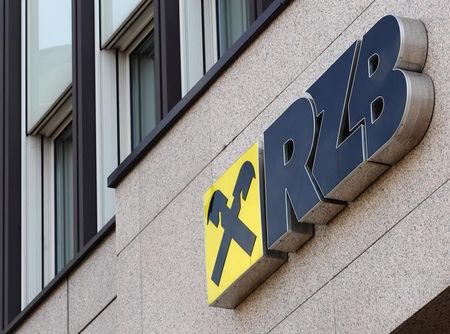VIENNA (Reuters) - Raiffeisen Zentralbank (RZB) [RZB.UL], which passed European bank stress tests at the weekend, would have looked more strongly capitalized if funds raised this year and a new capital regime were included, it said on Monday.
Under the new capital regime, unlisted RZB can count as capital whatever capital its emerging Europe arm Raiffeisen Bank International (RBI) (VI:RBIV) has surplus to requirements.
RZB explained the impact of the rule changes during a conference call following the publication of the results of European bank stress tests, which RZB passed easily.
But the new capital regime will also mean a stricter separation of RZB and RBI so that Johann Strobl can no longer remain risk chief at both banks and will have that role only at RBI, he said during the call.
The European stress test exercise also did not include the new capital regime when measuring how RZB would fare under new global capital rules, known as Basel III, that take full effect in 2023.
If the new rules and RBI's rights issue were included this would boost RZB's 2016 common equity tier 1 ratio in an adverse scenario by 4 percentage points to 7.9 percent, the bank said. RBI raised about $3.8 billion in January to strengthen its balance sheet and repay state aid.
RBI Chief Executive Karl Sevelda reiterated on the conference call that RBI expected a 2014 loss of up to 500 million euros ($634 million) this year partly due to hits from Ukraine and Hungary and that RBI was unlikely to pay a dividend should it post an actual loss. RBI is emerging Europe's second biggest bank.
Sevelda said the banking environment remained challenging, so RBI would look to shed businesses that were insufficiently profitable or tied up too much capital.
Partial writedowns on 198 million euros of goodwill in Poland and on 150 million euros in deferred tax assets booked at the head office could also weigh, he said, although this was still under review.
RBI kept its outlook for risk provisions of 1.5-1.7 billion euros this year, of which it would book around 1.1 billion in the first nine months.
RBI will make a provision of 205 million euros in the third quarter to cover expected costs from a law in Hungary that makes banks compensate customers for unilateral rate changes on loans and what the government calls mis-priced foreign-currency loans.
After a second-quarter charge for this, provisioning so far totals 272 million, slightly above the 240 million euros the bank had previously forecast for this year, Sevelda said.
Sevelda reiterated that Western sanctions against Russia over the its role in the UKraine crisis were not having a significant impact on business and that Raiffeisen remained committed to the Russian market.
But a falling rouble was hitting capital. The net effect of all foreign exchange moves took 26 basis points off common equity tier 1 capital in the third quarter and another nine basis points so far in the fourth quarter, he said.
RBI shares were up 1.7 percent at 17.285 euros by 8.39 a.m. EDT.

(Reporting by Michael Shields and Angelika Gruber. Editing by Jane Merriman)
